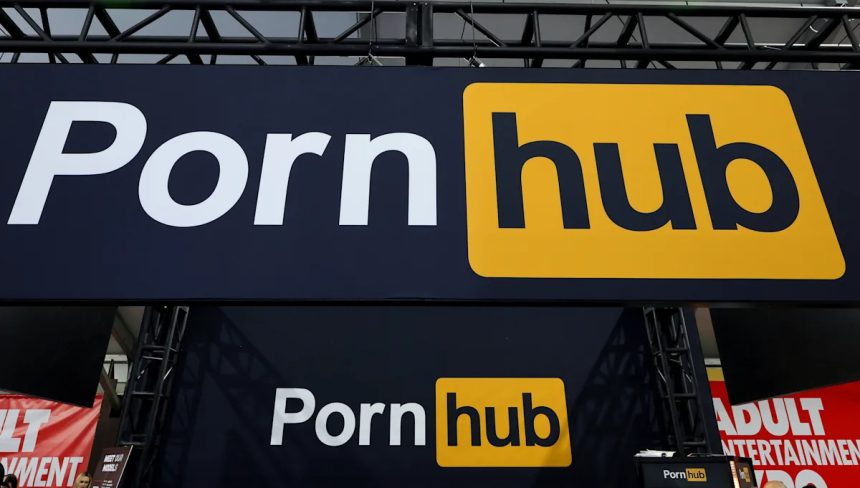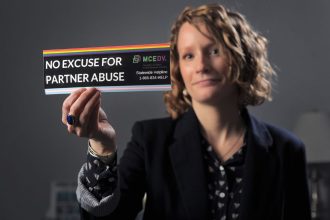The owner of Pornhub said it will block access to Arizona consumers because of the state’s new age verification law that takes effect Sept. 26.
Montreal-based Aylo claimed the soon-to-be new law will prove “ineffective, haphazard, and dangerous” by steering children to more extreme sites.
First Amendment advocates worry Arizonans who use the site will lose something their constitutional rights should protect.
But Rep. Nick Kupper, a first-term Republican lawmaker from Surprise, hopes the law reduces the number of children accessing porn. He said porn “warps children’s minds” and that if most children stop viewing it, “it builds a better society for us.
Democratic Gov. Katie Hobbs signed Kupper’s bill into law earlier this year despite minimal support by Democratic lawmakers.
Pornhub has already pulled out of 21 states because of similar laws the company says make the internet “more dangerous for adults and children.” Online rankings typically list the site as one of the most visited in the world.
When it tried to comply with a similar law in Louisiana, its business there dropped by 80%, according to the company’s statement.
“These people did not stop looking for porn,” the company said. “They just migrated to darker corners of the internet” where rules aren’t followed.
Aylo didn’t immediately say whether other sites it owns or manages, including RedTube and YouPorn, will also go dark in Arizona.
What does the law do?
The law requires porn sites, defined as sites with 30% or more of sexual content that’s “harmful to minors,” to obtain a government ID or another “commercially reasonable method” to verify users are 18 or older.
Other methods could include credit card information and an uploaded photo, Kupper said.
Whatever method the porn site chooses, it could not legally retain the age verification data or transmit it to any government source. But how that could be enforced against sites in other countries isn’t clear.
The new law will allow parents or guardians of children who got onto a “harmful” site that didn’t use one of the law’s methods to sue the site’s owners. A successful lawsuit would mean fines of $10,000 for every day the site didn’t comply with the law, $10,000 for each time it unlawfully transmitted the identifying day, and up to $250,000 if a child actually accessed porn on the site.
“Bona fide news” and “public interest broadcast” or other reports would not be affected, nor would search engines and internet providers.
Like other laws signed by Hobbs this year, it takes effect 90 days after the last day of the legislative session, which this year will be Sept. 26.
Anti-‘dark money’ law: An Arizona law promised to end secret political donations. Did it work?
Supreme Court upheld similar law
Kupper said creating the age verification bill was one of his priorities after being elected last year. A bit of research led him to believe a bill in Texas “had made it further in the courts than any other bill,” so “that would be the one to start from.
On June 27, the U.S. Supreme Court upheld Texas’ law in a 6-3 vote.
Opponents of age verification laws had argued they violated Americans’ First Amendment rights by placing barriers on adults’ ability to access constitutionally protected expression.
But Justice Clarence Thomas, writing for the majority opinion, said the law advanced Texas’ “interest in shielding children from sexually explicit content.”
It was constitutional since the law has only an “incidental” burden on adults, and “adults have no First Amendment right to avoid age verification,” Thomas wrote.
Justices Elena Kagan, Sonia Sotomayor and Ketanji Brown Jackson dissented. Kagan, for the minority, wrote that Texas undoubtedly had good reason to restrict kids’ access to sexually explicit material, but that the burden to adults was direct, not incidental.
She said the state should have had to prove its regulation was the least restrictive method possible, since it burdened adults’ access.
“What if Texas could achieve its interest without so interfering with adults’ constitutionally protected rights in viewing the speech?” Kagan wrote.
Possible workarounds and leaks
Kagan and other critics of the law, including Pornhub, warn that a site operator could sell the ID information, which could also be obtained by hackers and disseminated.
Laws like Arizona’s that require users to send “highly sensitive personal information” to companies will put consumers in jeopardy, Pornhub said in its statement, adding that “unless properly enforced, users will simply access non-compliant sites or find other methods of evading these laws.”
Timothy Libert is a former Google engineer whose current business, webXray, LLC, checks how sites of all types leak consumers’ private information to third parties. He agreed with both of those points.
“These laws are only going to shut down the porn sites that have an interest in following laws, which tend to not be the worst porn sites on the internet,” said Libert, who is also a former Carnegie Mellon University researcher. “I think this actually makes it more likely children will be exposed to more extreme forms of pornography.”
WebXray’s database can be used to show how thousands of porn sites that collect and disseminate personal information like names, emails or even passwords to third parties. The database shows that many low-profile porn sites already don’t ask for any kind of age verification. Libert said some of those sites depict violence, rape or “revenge porn.”
Inevitably, data like a list of verified names of porn site users and their browsing habits will be leaked from sites, he said.
Yet accessing mainstream porn sites, including Pornhub, won’t necessarily be a problem for some children or teens, Kupper acknowledged.
For instance, using a virtual private network, or VPN, a web user can make it appear as if they live in a different state — one without a law like Arizona’s, he said.
Traveling abroad? Here are security tips you should know to avoid scams and hackers
Christian group applauds new law
Center for Arizona Policy, one of Arizona’s preeminent Christian conservative advocacy organizations, was an ardent proponent of Kupper’s legislation.
Peter Gentala, president of the group, celebrated Pornhub’s announcement as a win for children.
“Pornhub makes the most dangerous and degrading material easily accessible to children online. Thanks to the leadership of Arizona’s legislature and Governor Hobbs, Arizona’s children will be safer starting this week—but more work remains,” Gentala said. “As their campaign against age verification laws demonstrates, Pornhub and the sex industry always put profits over people. Expect them to continue to oppose commonsense protections at every turn.”
The Center for Arizona Policy vehemently opposes pornography, calling it “a social toxin that destroys relationships, steals innocence, erodes compassion, and breeds violence against women.”
Republicans have long held an anti-porn stance, including in the conservative Project 2025 policy guide, which seeks to criminalize pornography.
The Republican-dominated Arizona Legislature declared pornography a public health crisis in a 2019 resolution.
Twelve Democrats in the House voted initially in favor of Kupper’s law initially this year. After listening to critics who feared the law could unfairly target LGBTQ-oriented sites that weren’t pornographic, only three Democratic lawmakers — one in the Senate and two in the House — voted in favor of it on final passage.
Rep. Junelle Cavero, a Phoenix Democrat, said she voted against Kupper’s bill because it imposed “overly restrictive limitations on First Amendment rights” on content that’s controversial but still lawful.
“Its structure could enable censorship of a wide range of sexual content, including non-pornographic, educational, and LGBTQ-themed resources,” she said, adding parents should monitor their children’s online activities.
Kupper said the law has no such intent.
News alerts in your inbox: Don’t miss the important news of the day. Sign up for azcentral newsletter alerts to be in the know.
Reach the reporter at rstern@arizonarepublic.com or 480-276-3237. Follow him on X @raystern.
Taylor Seely is a First Amendment Reporting Fellow at The Arizona Republic / azcentral.com. Do you have a story about the government infringing on your First Amendment rights? Reach her at tseely@arizonarepublic.com or by phone at 480-476-6116.
Seely’s role is funded through a collaboration between the Freedom Forum and Journalism Funding Partners. Funders do not provide editorial input.
This article originally appeared on Arizona Republic: Pornhub to pull out of Arizona over new age verification law









